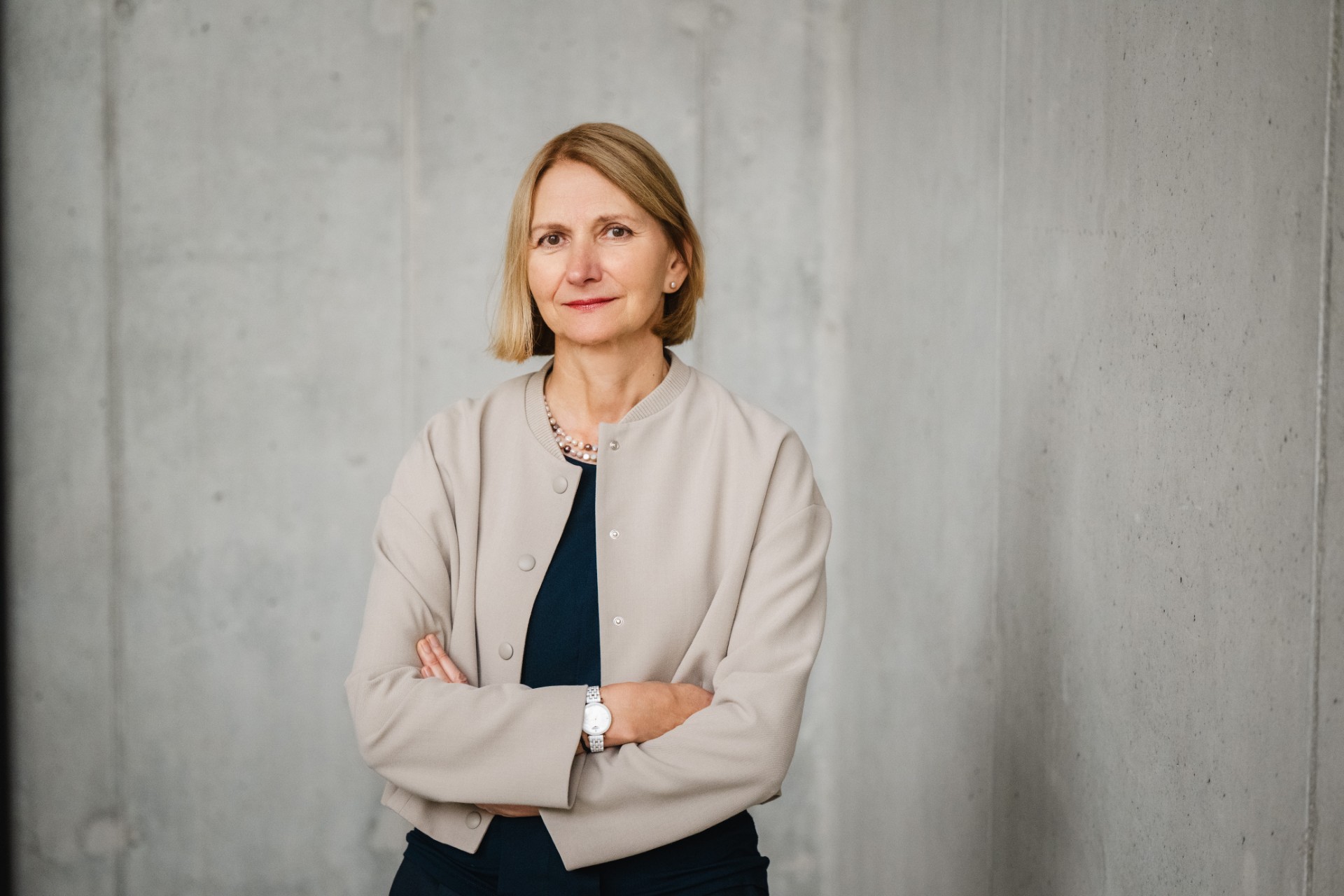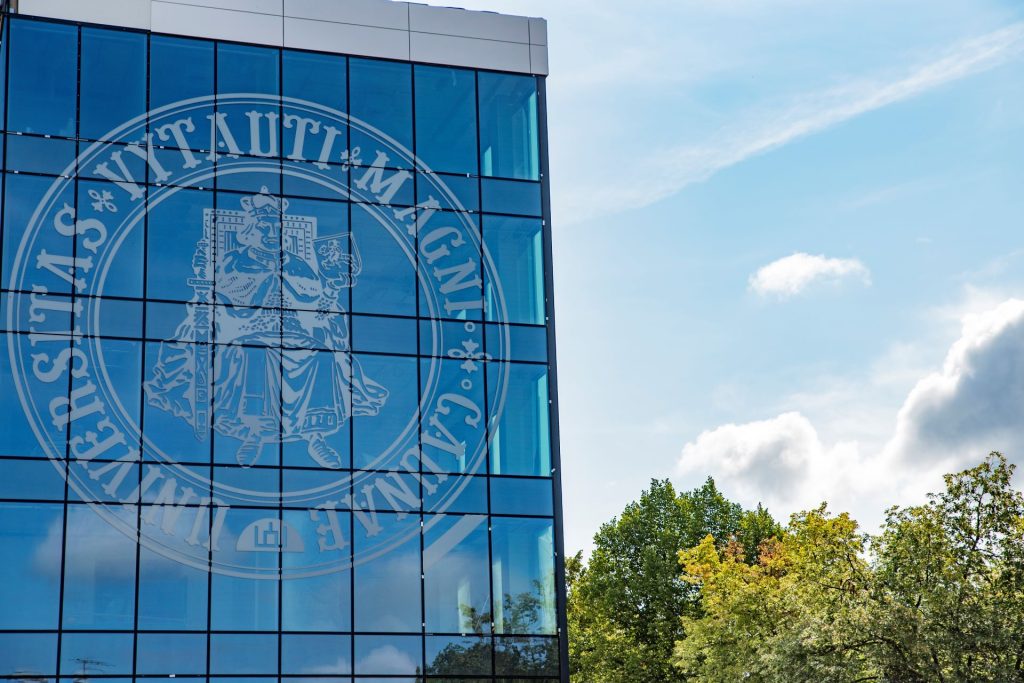New VMU Rector Prof. Dr. Dabašinskienė: a University Must Also Be a Centre of Moral Leadership

As of October 1, the new rector of Vytautas Magnus University (VMU) begins her work – academician and professor Ineta Dabašinskienė. “Leading a university is a huge responsibility, but also an opportunity to create meaning: to unite the academic community for a common task. Our goal is not only to respond to today’s needs, but also to shape the horizons of the future. A university is strong to the extent that it remains faithful to its fundamental values: academic freedom, critical thinking, creativity, and holistic education. This conviction, grounded in the principles of liberal arts, is our firmest support and our main direction,” notes the VMU rector, in a conversation discussing the universities of the future, community-based leadership, today’s students’ values, and ways to unwind after intensive work.
What role do you see for universities today and in the future?
Universities must remain centres of knowledge and free inquiry, while at the same time addressing contemporary needs linked to technological, economic, and social innovations. For example, artificial intelligence – already a part of everyday life – should remain a helper, not a decision-maker replacing humans; therefore, it is essential to cultivate the ability to critically evaluate these tools and use them responsibly.
Resilience is particularly important for universities today – and here we are speaking not only about infrastructure or technologies. To operate successfully amid geopolitical and economic unpredictability and various risks, and still promote long-term change, universities must maintain a moral backbone, strengthen a culture of trust, and set an example of responsibility for society.
I also see the university of the future as a hotbed of innovation and progress. Here, diverse expert competencies are acquired, interdisciplinary modes of working are understood and practiced, and free, responsible, noble individuals are educated: people who have the courage to act, to take risks, and to make mistakes.
A university must also be a place of moral leadership. Living in an era of information noise and competition, we must strive to create an atmosphere of trust, dialogue, and cooperation, defend universal human values, and remain open to the world’s diversity. A university must set an example that honesty and compassion can change the world. In my vision, I see VMU as a university that unites tradition and modernity, is open, bold, responsible, empathetic, and capable of surprising both Lithuania and the world with its achievements.
How do you understand leadership? Which qualities do you value most in a leader?
I take a contemporary view of leadership: I do not see a leader as strict and all-knowing. Much more important is a community-minded leader who listens. I value leadership that is democratic – based first and foremost on dialogue and empathy. A university is alive only when each of its members feels responsible for change.
Therefore, among my first tasks will be to involve the community in decision-making. Decisions should not be made behind closed doors but should be born in discussions where different voices and opinions are heard. We will organize working groups dedicated to various essential areas of university activity: from the research ecosystem and budget planning to the integration of artificial intelligence and alumni engagement.
What do you see as the biggest challenges in Lithuanian higher education?
I see great potential for our country to stand out internationally for the quality of its higher education. But I also see three core problems: weak trust between the state and universities, a demographic crisis, and constant reforms that destabilize the entire system.
Lithuanian higher education institutions are strong, but they could compete even more in the world and in Europe if there were less control and more trust. Excessive regulations and lengthy approval procedures hinder innovation. My aim is less bureaucracy and more real experimentation and digitalization.
University autonomy must be understood as a necessary condition for high-quality activity and for the advancement of research and studies. This is genuine academic freedom: the right to doubt, discuss, and pose questions. It is also a commitment to strive for the highest quality, to be accountable for one’s words and actions, to defend one’s views, and to serve as a moral compass. All of this begins with trust: the state must allow universities to operate more freely, and universities, in turn, should demonstrate transparency and results.

How do you see today’s youth and what could attract them to the university today?
Increasingly, we see that young people choose studies not for a piece of paper with a stamp, but for the opportunity to act and create. It matters to them that studies allow for experimentation, joining different teams, and solving issues that truly change the world: from climate change to social equality or the ethics of artificial intelligence. VMU’s response is studies that take place not only in the classroom but also in real projects. Here, students see the entire process – from idea to implementation – learning to collaborate, take responsibility, and take real action.
VMU will offer an increasingly interdisciplinary path: joint modules where technology, languages, law, or business meet, along with the creative freedom to try oneself in different fields. We want – and will strive – to ensure that during their studies, young people discover not only professional knowledge but also themselves: their strengths, talents, and calling. That they gain practical experience, engage in meaningful activity, and feel that they can not only learn but also create, contribute, and effect change.
It is very important to understand that the University is a special place in life where ideas and friendships are born, social networks are formed, and circles of like-minded people take shape. Students meet friends with whom they will share experiences for a lifetime and with whom they will create joint projects, businesses, or ideas for the future. It is not only the content of studies but also a community of life that becomes a support for the entire path ahead.
In your program you name four strategic directions on which VMU’s future will be based. What are the most important priorities for the university’s future?
A responsible community: an academic family in which transparency, mutual support, and empathy are everyday realities, and where faculty autonomy and the student voice have real power to change decisions. Open studies: a modern, flexible system grounded in renewed liberal arts principles, enabling more harmonized study modes and lengths, in which theoretical insights are reinforced in real situations, developing both professional and life skills.
Ambitious research: a strategic direction that fosters international projects based on innovation, strengthens doctoral studies, and promotes open science principles so that Lithuania’s distinctive research fields become part of the global academic community. I believe we must participate more actively in ensuring the region’s and the country’s future security – the university is a space where science, technology, innovation, and practical solutions meet. By collaborating with partners in business, industry, the state, and municipalities, we must concentrate academic potential to create not only knowledge but also products and value that meet society’s real needs today. Finally, resilient infrastructure – this is not only modern laboratory buildings or technologies, but also a sustainable, digitized, and secure environment in which the entire community can comfortably live, work, and create.
With everyone united in work, these directions will, in my conviction, allow the university to grow and strengthen, and VMU will become a centre of attraction in Lithuania – a space that not only inspires the pursuit of academic heights but also cultivates responsibility, dialogue, and faith in shared values.
This summer, shortly after the rector’s election, you travelled extensively abroad, visiting universities in Latvia, Norway, France, Ukraine, and the United States. Will these business trips help in adopting their best practices?
Absolutely. Each university offered a valuable, distinctive perspective on higher education management, but the visit to the Massachusetts Institute of Technology (MIT) – one of the world’s leading and most advanced universities – left the greatest impression. MIT experiments boldly, combining technology and the arts, solving real-world problems in laboratories, and operating quickly, without major bureaucratic obstacles. They provide an excellent example of effective work in interdisciplinary teams and active collaboration with businesses and other sectors.
This year, VMU together with other Lithuanian universities and business partners joined the MIT MISTI program, which opened up opportunities for broad cooperation and, we hope, will contribute to modernizing the country’s education, creating high-qualification jobs, and developing innovation and technology. It is truly gratifying that VMU is coordinating this highly promising collaboration.
No less exceptional were the meetings with the Ukrainian academic community. Our colleagues from Mariupol State University, currently operating in Kyiv, are a true symbol of resilience. It is impossible to put into words the strength of the Ukrainian people, living amid constant sirens. Mariupol University continues to operate successfully even during the war, having preserved its community and international ties. Resilience is not only about buildings or technologies but also about people: their courage, faith, trust, and hope. We have much to learn from them.
How do you relax after intensive workdays and visits?
I try to slow down: sometimes a conversation with family over dinner, a walk, or simple exercise is enough. If I have more time, a book helps – usually philosophy and essays, but I also enjoy good fiction. Poetry in the evenings is a true respite. In my free time, I like to watch French, Central and Eastern European cinema, and listen to various kinds of music – from classical and opera to contemporary symphonic, popular music, and jazz. I’m quite a universal listener and viewer: many things interest me, as long as they are of quality, inspiring, or capture a mood and emotion.
This summer I realized that sometimes you don’t need mountains or seas for perfect rest – peace and quiet at home is enough, and I miss it very much because I often have to travel. My perfect weekend would be simple: no meetings, at home, with a good film or book, tasty food, and light conversation. Sometimes precisely such quiet and simplicity become a true luxury.
Which person or experience most inspired or shaped your values?
I believe the foundations of my values were laid by my family, and later by the teachers, friends, and companions I met, and the books I read. Everything I carry in my mind and heart has shaped my path. Life at VMU has become a special space: I found a wide field of horizons here, opportunities for deepening, and a sense of community. Dear friends Leonidas Donskis, Egidijus Aleksandravičius, and many other colleagues whom I consider true pillars of the university have been very important. But I have also been influenced by people I met during travels and authors I discovered. I could say I’m “infected” with Vytautas Kavolis’s “virus”: his ideas about the nobility and freedom of the individual, and responsibility. Values for me are not just theory – they reveal themselves in creating and maintaining relationships, in making choices, in everyday actions. It is not by words but by deeds that we show what truly matters to us: that is what I strive for, and will continue to strive for, in my life and work.












